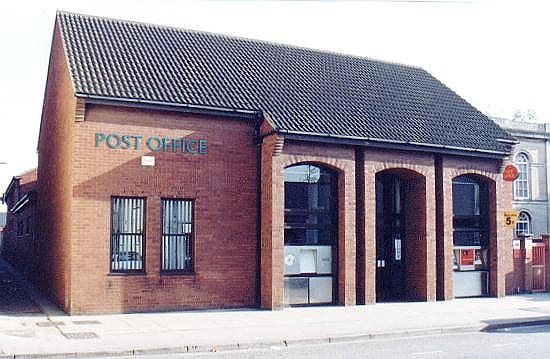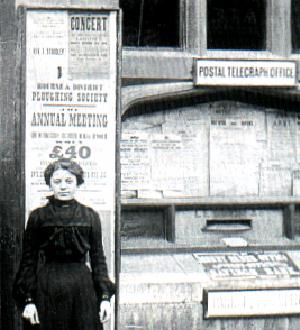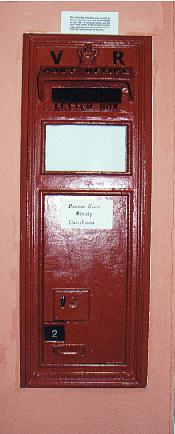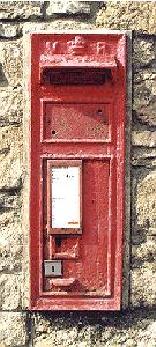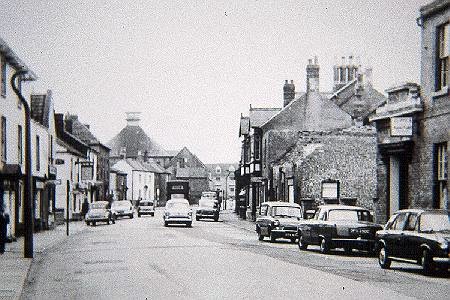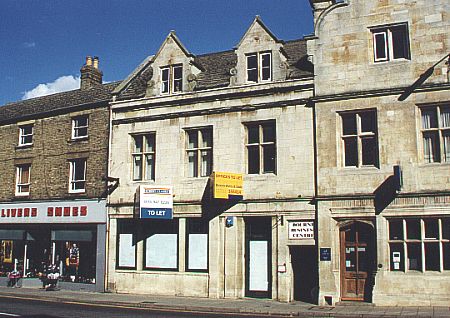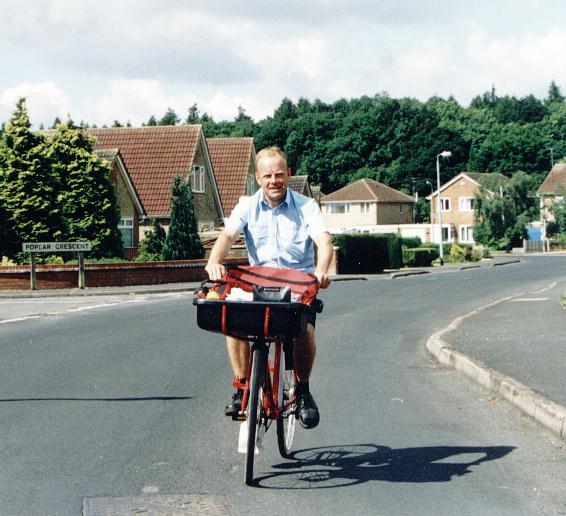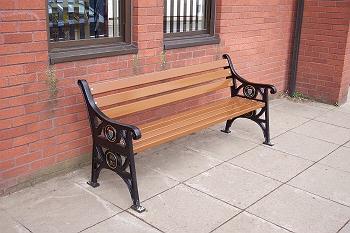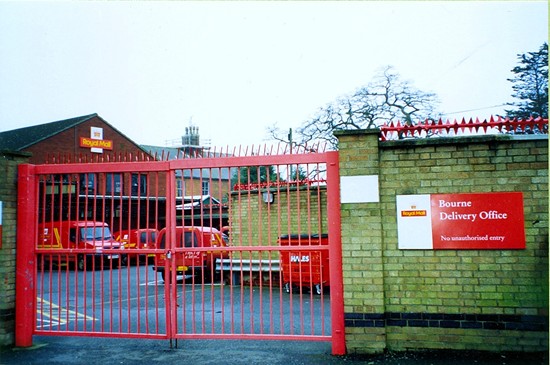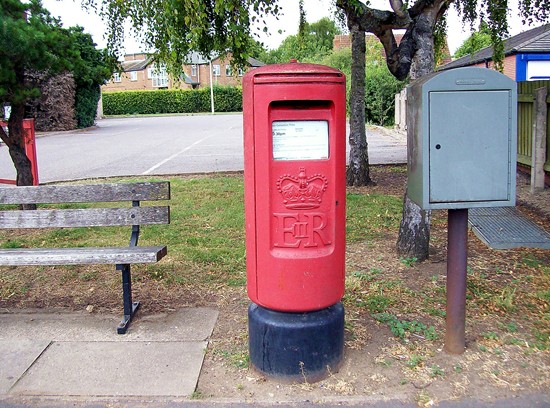|
The Post Office
Postal services
were a vital part of Bourne's business communications during the 19th century. A General Post Office was established in England by Act of Parliament in 1656 and the collection and delivery of mail was mainly carried out by the regular coaching services but it was generally a costly business. The introduction of the penny post by Rowland Hill in 1840 brought the postal service within the reach of everyone and therefore resulted in a tremendous increase in the volume of mail and by 1849, the number of letters carried had reached almost seven million.
The telegraph and post office was moved from the Abbey Road premises in 1870 to make way for the building of the new Corn Exchange and a new post office opened in North Street. Mr Towns Gatliffe remained as postmaster until Friday 12th February 1875 when he retired with a pension from the Post Office after 28 years and John Thomas Pearce took over and ran the business in conjunction with his stationery shop next door. The postmen who delivered the mail around the town were issued with uniforms in the summer of 1875, although those who worked in the rural areas had already received them. The Grantham Journal reported on Saturday 5th June that year: "Until the present month, Bourne has been behind other towns as regards postmen's dress which has hitherto been civilian. At last, however, a neat and useful uniform has been provided. The rural postmen were so equipped some two years ago." The telephone was introduced to Bourne three years later after a demonstration at the Corn Exchange by Mr T Viccars, of Torquay, "on Professor Bell's long and short circuit telephones". The Stamford Mercury reported on Friday 1st March 1878: There was a highly respectable audience and for a Saturday night as numerous as might be expected. The Rev G E Massey, Vicar, presided. The lecturer in a lucid manner explained the physical and psychological facts which were necessary to understand in connection with the action of the telephone. One of the rooms of Mr Morris, printer, [in West Street], had been connected with the Corn Exchange by a wire, and conversation was carried on between members of the audience and persons at the other end. By 1903, the postal services had been considerably extended. J J Davies remembers this post office in his book Historic Bourne (1909) as " . . . a fine structure, splendidly managed, and equipped with the latest telegraphic and telephonic appliances." Telephone trunk lines were erected through Bourne in the early years of the last century. The double poles, known as H-poles, that can be seen on photographs of the period, were moved into the area by rail direct from the factory in 1906, the freight train off-loading each consignment at railway stations and sidings along the route between Peterborough and Lincoln. Those destined for the Bourne area were then moved to the various sites by George Bullimore, a wood and timber merchant, based at the Crown Inn [now the Wishing Well] at Dyke, who transported them in wooden drugs, huge wagons normally used to shift tree trunks and pulled by up to six horses. Once the holes had been dug for them, they were erected by block and pulley and then fitted out with the required insulators before being brought into use in 1907. In 1944, a manually operated telephone exchange was opened at the Post Office premises in North Street and this continued in use for more than twenty years when an automatic telephone exchange was built in Manning Road at a cost of £45,000. Work began in October 1962 and by July 1964, the electronic was being installed and the new system was brought into use at 1.05 pm on Friday 9th April 1965 when 560 subscribers were connected, enabling them to use the dials that had recently been fitted to their instruments by engineers. The exchange was such a momentous change in the development of communications for Bourne that an inauguration ceremony was held at the Darby and Joan Hall, attended by local authorities, civic and commercial organisations, and at the appointed hour the mayor, Councillor J K Mason, dialled the first call to the Mayor of Stamford, Councillor G W Gray, at the Town Hall in Stamford. At the end of the call, he pressed a button to bring the new exchange into public service. A booklet was sent to all residents giving full details of the changes and how to use the dial telephone together with the various area codes through which subscribers could make calls to 36 other exchanges in the country. The 999 emergency service was introduced at the same time and as Bourne had lost the bulk of its manual telephonists because of the new system, these calls were handled by the Spalding exchange. There were no redundancies, however, and all staff were offered alternative employment. The charge for local calls was 3d. for three minutes during the full rate period and 3d. for six minutes during the cheap rate period. The new boxes accepted only six-sided threepenny bits, sixpences and shillings and traders in the town soon found that there was an increased demand for these coins when offering change. STD, or subscriber trunk dialling, was not immediately available and Bourne had to wait two years until the telephone exchange at Spalding was fitted with the necessary equipment. The opening also marked the appearance of a new type of pay and answer coin box at telephone kiosks throughout the town and public demonstrations were held at various venues during April to ensure that customers knew how to use them by making trial calls and listening to the pay tone, an added feature of the new system.
Letters from London were arriving four times a day and there were three daily deliveries. The last collection for the capital was between 7 pm and 8 pm and the wall letter boxes that had been introduced in 1853 were so popular that they were being cleared three times a day, the last time varying according to location, between 6.45 a m and 7.05 p m. There were many such post boxes around the town but they were much smaller than those in use today. John Pearce died suddenly in January 1905 at the early age of 59 and he was succeeded as postmaster by his son William who recognised the importance and potential of the postal work and immediately began enlarging the premises still further, moving the stationery business to a new shop in North Street. The work was completed by the autumn and the Stamford Mercury reported on Friday 24th November: During the last few weeks, considerable alterations have been carried out on the premises that are in future to be used wholly as a Post Office. The stationery business of Mr Pearce has been removed to North Street and what used to be the shop and showroom is now converted into rooms for the Post Office work. A larger counter has been provided and a stand placed near the window for writing telegrams and in the corner has been placed the public telephone. Behind the counter, the room, used as a showroom, has been converted into the telegraph and telephone operators' rooms. The new portion of the Post Office was opened for public business on Friday last.
The horse drawn mail cart used to transport postal items between Bourne and Peterborough was replaced by a motor van on 10th May 1915, as was the mail cart from Bourne to Folkingham. The motor van also started making collections and deliveries at Morton, Haconby, Dunsby, Rippingale and Kirkby Underwood to connect with despatches from Bourne at 10.30 and 11.45 a m. The new service resulted in some redundancies and Mr A S Allen, who had driven the mail cart to fetch the night letters for Dowsby for more than 23 years, was presented with a family bible to mark his lengthy service together with an acetylene lamp. Business at Bourne Post Office continued to expand as the population increased and eighty years later, the premises had become so cramped and inconvenient for staff that a new Post Office, complete with sorting office at the rear, was opened in 1981, one of the most modern in South Lincolnshire. The site chosen was in West Street and included three old cottages, Nos 22, 24 and 26, that were demolished to make way for the new development.
The land was bought from the Bourne Baptist Church who had owned it since 1952 when it had been purchased at auction for £250 although it is not known how much they sold it for. The old Post Office premises were vacated and subsequently became an off licence and then after several months of standing empty, were taken over in 2000 by the estate agents Quinney Marks.
The new red brick Post Office has been extremely popular with customers, providing more space for their transactions and, more importantly, for the regular queues that build up on pension day and at other busy periods, although there have been some problems. In 1984, the management at Peterborough insisted on closing on Wednesday afternoons to enable staff training sessions to take place to improve the standard of service to customers but townspeople complained that they were being denied a valuable service and the decision was later rescinded after official protests by the town council, the Post Office Users' Council and the local M P, who was then Sir Kenneth Lewis.
A major restructuring of the Post Office in the summer of 1988 brought a fresh threat to the service when, because Bourne was one of the smallest Crown offices in the country, it was proposed to cut costs by downgrading it to an agency office. This would involve handing the business over to an agent or sub-postmaster who would be offered the premises on lease from the Royal Mail or run it from his own business address. The most acceptable application involved transferring the Post Office to premises at Nos 42-44 North Street which were then being used as a launderette and although the management considered this, it proved to be a major misjudgement and a wave of public protest followed when the issue was taken up not only by the local newspapers but also by the television and radio channels. The town council also complained that the premises were totally unsuitable for postal services and that customers would have to queue outside on the pavement while vans delivering and collecting mail would create havoc for passing traffic. The management were forced to rethink their strategy and in 1991 the Post Office appointed a new sub-postmaster who was allowed to stay in the present building although it is now run under private contract. As a result, the postal services that were once the only transactions carried out here have been supplemented by a range of retail outlets such as greetings cards, sweets and stationery, designed to keep the business economically viable, although the aura is now one of a shop rather than the trustworthy and reassuring atmosphere that the post office exuded in past times. Nevertheless, it remains in appearance and operation, the town's Post Office, a much loved facility, and in 2003, a second attempt to close it and relocate the business, this time as a counter service at the back of a liquor store 50 yards down West Street towards the Market Place, was abandoned after several months of protest by the public and local organisations.
REVISED MAY 2014
See also Memories of the mail cart Post boxes may soon disappear
Go to: Main Index Villages Index |
||||||||||||||||||||||||||
